- Clone
- Poly4054 (See other available formats)
- Regulatory Status
- RUO
- Isotype
- Goat Polyclonal IgG
- Ave. Rating
- Submit a Review
- Product Citations
- publications
| Cat # | Size | Price | Quantity Check Availability | Save | ||
|---|---|---|---|---|---|---|
| 405405 | 500 µL | 113€ | ||||
Goat anti-rat IgG antibody reacts primarily with the heavy chains of rat IgG, but also partially binds to the light chains common to most rat immunoglobulins. No cross-reactivity has been detected against non-immunoglobulin serum proteins. This antibody has been solid-phase absorbed to ensure minimal cross-reaction with rabbit, human, bovine, horse, and mouse immunoglobulins, but it may cross-react with other immunoglobulins from other species.
Product DetailsProduct Details
- Verified Reactivity
- Rat
- Antibody Type
- Polyclonal
- Host Species
- Goat
- Formulation
- Aqueous buffered solution containing a carrier protein and preservatives.
- Preparation
- The polyclonal antibody was purified from goat antiserum by rat immunoglobulin affinity chromatography.
- Concentration
- Lot-specific (to obtain lot-specific concentration and expiration, please enter the lot number in our Certificate of Analysis online tool.)
- Storage & Handling
-
The antibody solution should be stored undiluted between 2°C and 8°C, and protected from prolonged exposure to light. Do not freeze. To obtain lot-specific expiration date, please enter the lot number in our Concentration and Expiration Lookup or Certificate of Analysis online tools.)
This product has a shelf-life of 12 months or less. Please use our Expiration Lookup Tool to verify the expiration date of your lot of product - Application
-
ELISA - Quality tested
- Recommended Usage
-
Each lot of this antibody is quality control tested by ELISA assay. Do not use this product beyond the expiration date. For ELISA or Western blot analysis, the reagent should be titrated between 1:1,000 - 1:5,000 to determine optimal conditions. For IHC on tissue sections, the reagent should be titrated between 1:500 - 1:2000 to determine optimal conditions. It is recommended that the reagent be titrated for optimal performance for each application. Avoid using diluent solutions containing sodium azide. Sodium azide is an inhibitor of horseradish peroxidase.
- Application Notes
-
This goat anti-rat IgG antibody is useful for direct immunofluorescent staining or as a second step reagent for indirect immunofluorescent staining when used in conjunction with primary antibodies.
- Additional Product Notes
-
This HRP conjugated goat anti-rat IgG antibody is useful as a second step reagent for indirect immunohistochemistry staining when used in conjunction with primary antibodies.
- Application References
- Product Citations
-
- RRID
-
AB_315016 (BioLegend Cat. No. 405405)
Related FAQs
Other Formats
View All IgG Reagents Request Custom ConjugationCustomers Also Purchased
Compare Data Across All Formats
This data display is provided for general comparisons between formats.
Your actual data may vary due to variations in samples, target cells, instruments and their settings, staining conditions, and other factors.
If you need assistance with selecting the best format contact our expert technical support team.
-
APC Goat anti-rat IgG (minimal x-reactivity)
-
FITC Goat anti-rat IgG (minimal x-reactivity)
-
HRP Goat anti-rat IgG (minimal x-reactivity)
-
PE Goat anti-rat IgG (minimal x-reactivity)
-
Purified Goat anti-rat IgG (minimal x-reactivity)
-
PE/Cyanine7 Goat anti-rat IgG (minimal x-reactivity)
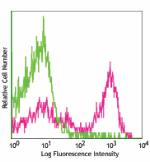
C57BL/c mouse splenocytes stained with purified rat anti-mou... -
Cyanine3 Goat anti-rat IgG (minimal x-reactivity)
-
Brilliant Violet 421™ Goat anti-rat IgG (minimal x-reactivity)
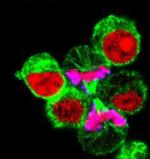
293E cells were stained with purified anti-Histone H3-Phosph... -
Alexa Fluor® 647 Goat anti-rat IgG (minimal x-reactivity)
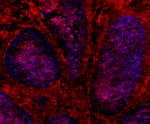
Human frozen tonsil section was fixed with 4% paraformaldehy... -
Alexa Fluor® 488 Goat anti-rat IgG (minimal x-reactivity)
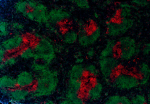
C57BL/6 mouse frozen spleen section was fixed with 4% parafo... -
Alexa Fluor® 555 Goat anti-rat IgG (minimal x-reactivity)
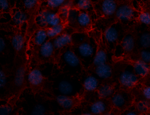
NIH/3T3 mouse fibroblasts were fixed with 1% paraformaldehyd... 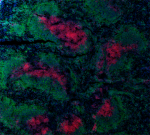
C57BL/6 mouse frozen spleen section was fixed with 4% parafo... -
Alexa Fluor® 594 Goat anti-rat IgG (minimal x-reactivity)
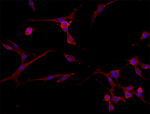
NIH/3T3 mouse fibroblast cell line was fixed with 1% parafor... 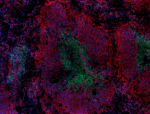
C57BL/6 mouse frozen spleen section was fixed with 4% parafo... -
PerCP/Cyanine5.5 Goat anti-rat IgG (minimal x-reactivity)
-
APC/Fire™ 750 Goat anti-rat IgG (minimal x-reactivity)
-
Brilliant Violet 605™ Goat anti-rat IgG (minimal x-reactivity)
-
PE/Dazzle™ 594 Goat anti-rat IgG (minimal x-reactivity)
-
Biotin Goat anti-rat IgG (minimal x-reactivity)

 Login / Register
Login / Register 




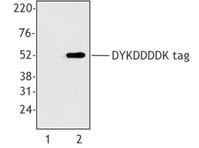

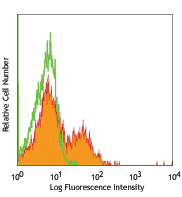



Follow Us